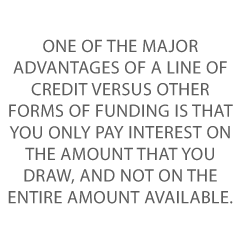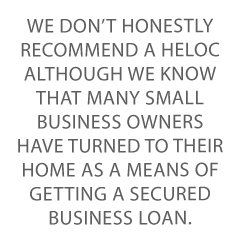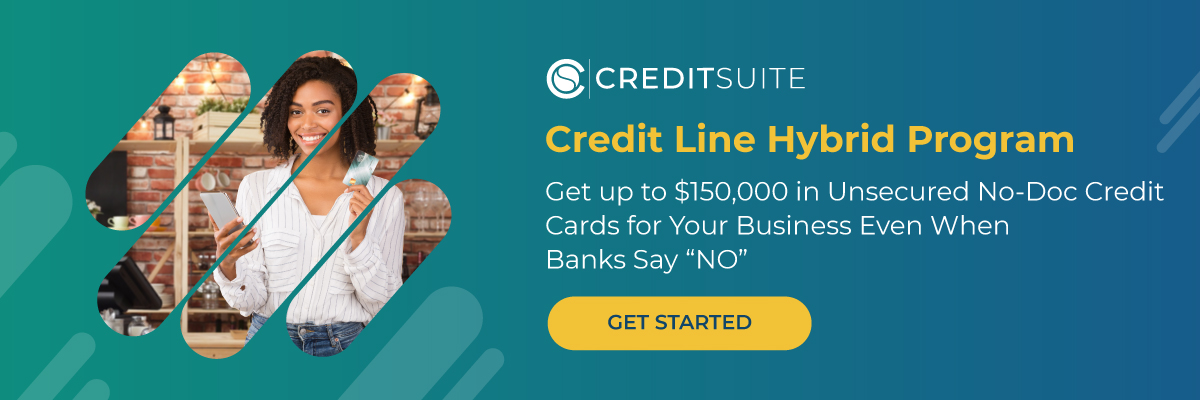Do any no collateral business startup loans exist? They do!
But you may need to redefine what you think of as a startup business loan, and even what a startup is. This is because a startup isn’t just a company that was formed yesterday. Startups with a year or more of existence will have an advantage over newer businesses.
Option 1 – The Credit Suite Credit Line Hybrid
For a small business owner with good personal credit (as in 700 or better), the Credit Line Hybrid is a smart choice. Working with a credit partner with such good credit is another way to qualify for this form of business financing.
And since no collateral is necessary, this is financing which fills the bill for being a no collateral business startup loan.
Your small business can get a loan amount up to $150,000 in funding. Get ‘no doc’ financing in credit cards, some of which are business cards whereas others can be personal cards. You can even get introductory rates going as low as 0%!
You cannot have any bankruptcies and no more than three unsecured accounts opened in the past 12 months. Also, you can have no late payments in 2 years and no charged off accounts. You must have under 40% utilization on all revolving accounts.
Also, you cannot have any more than four inquiries per bureau in the last 12 months. This is not including secured inquiries like auto loans or mortgages.
Enjoy a reward for your excellent personal credit management—the Credit Suite Credit Line Hybrid is one of the best business loans that any company can get—and not just startups can benefit.
Option 2 – National Funding
You can get unsecured loans from National. They note that “many unsecured loans are backed by a personal guarantee or a UCC lien. An unsecured loan is a great option if your business doesn’t have physical assets, or you don’t want to provide any personal assets.”
Alternative lenders like National will generally offer less stringent credit or financial requirements. Also, they may have higher approval rates than a more traditional lender does.
You can take out a startup business loan when you need it, without having to worry about potentially losing a personal asset.
National caters to several different industries, including trucking and construction, insurance agencies and law firms, and more. Get a short term loan, equipment loans, or working capital loans.
Use the money to pay bills and consolidate debt, build cash reserves, buy marketing for your business, or any other business purpose you can think of.
Payments are withdrawn automatically, and you can get an early payment discount. Equipment financing has terms of two to five years, remitted monthly. Working capital loans have terms of four to 24 months, remitted on a daily or weekly basis.
All of their offerings are unsecured loans. In order to qualify for a loan, National requires a business to be in operation for at least six months and at least $250,000 in annual sales to get an unsecured business loan.
Option 3 – Fora Financial
This alternative lender offers small business loans with no collateral. There are no prepayment or application fees.
Businesses can get between $5,000 and $1.5 million in lending. These are loans without collateral, and they offer prepayment discounts. Fora will perform a soft credit inquiry when you first apply, and then a hard credit check upon approval.
Small business owners have an opportunity to increase the amount that they are borrowing after they have paid back 60% of the original loan. Use the loan proceeds for any business purpose as you see fit.
They offer a simplified process, without excessive documentation. This also means that you can get a decision a lot more quickly. They will make a funding recommendation in between four and 24 hours.
You will receive a lump sum payout within 24 to 72 hours. spend it at your leisure, as you see fit.
Fora offers both term loans and revenue advances.
Option 4 – an SBA Loan for $25,000 or Less
When you are borrowing only $25,000 or less, the Small Business Administration will not require collateral for you to be able to borrow. But you will have to assure lenders in some other fashion.
This can mean proving good, steady revenue, or offering up a personal guarantee (or maybe all of these).
And keep in SBA loans come with a rather involved process. Such loans are far from what anyone would call fast business loans. But since the SBA guarantees a portion of its business loans, a lender can be more confident loaning money to startups.
You are a lot more likely to qualify for this type of funding if you have good personal credit and your startup business has good business credit. These days, you can get SBA Loans from alternative lenders.
As small business loans go, the SBA loan is generally not seen as being something for a startup. However, if your startup is a few years old, and you have good documents which show revenue, then SBA Loans may very well be on the table.
These are term loans with varying terms. a very small loan such as this would tend to not have a very long term. And if you have a bad credit score? You can pretty much forget about getting this kind of business loan.
Option 5 – Equipment Financing
Just like getting a car loan, or even a mortgage on real estate, equipment financing is essentially just a way to spread out payments over time on something that’s very expensive.
This is a form of financing whereby you use your equipment as essentially collateral on a small business loan.You do not even have to own the equipment, and you do not even have to be buying it.
Rather, you can be using the equipment as collateral even if you are just leasing it.
A lender will most likely want to be looking at issues such as expected useful life and depreciation in the equipment. If you are buying used equipment, this can become much more of an issue than it would be with new equipment.
One advantage of this type of funding is that, because equipment is often rather valuable, it makes for very good collateral for a business loan. As such, the lender is less likely to turn down small business owners with bad credit. The equipment will, essentially, do all the talking.
This will nearly always have to be rather expensive equipment. A few computers here and there are most likely not going to cut it.
Option 6 – Merchant Cash Advances
A merchant cash advance is when a company has a lot of credit card receipts, but they have not been paid yet.
A small business can essentially use its unpaid credit card receipts as collateral for a small business loan. This even includes a relatively new business, although you will have to have a few months’ worth of unpaid credit card receipts in order to qualify.
The biggest thing that a lender is going to be looking at will be whether the companies that you have the unpaid receipts with have a reputation for paying their bills on time. You get a relatively high percentage of the receipts.
 One of the biggest advantages of MCAs is that you can use them as a means of providing good payment terms to your own customers and prospects.
One of the biggest advantages of MCAs is that you can use them as a means of providing good payment terms to your own customers and prospects.
If you give a company net 30, net 60, or even net 90 terms, it’s great for that company, but it’s not very good for you. This is because you just plain don’t have the use of the money for even up to a quarter of the year.
But with a merchant cash advance, you get the best of both worlds. You get a large percentage of what they owe you, and you get it quickly. The business owing you the money never needs to know that you are working with a merchant cash advance company.
Alternatives to Business Loans With No Collateral
Alternative 1 – Business Credit Cards
Think outside the proverbial box, because a business credit card can be a smart choice for funding a business. While it’s not an actual startup business loan, per se, it is still a legitimate form of financing.
And when your corporate credit card reports to one or more of the business credit bureaus, then you’ll be building business credit with every purchase and every paid bill. A good corporate credit score will make it easier for you to get business loans without having to put up collateral.
As a result, company credit cards can help your business both now and in the future.
Alternative 2 – Invoice Financing
Not too terribly different from MCAs, invoice financing is a means of leveraging incoming capital and using it as what is essentially collateral for a small business loan. A small business with a good, professionally prepared set of books will do the best with this form of financing.
Also, you will need for your outstanding invoices to be with businesses where you can reliably collect within 60 to 90 days.
Invoice financing providers tend to be banks. But they can also be large corporations or government agencies if you are under contract to them and this is the best or maybe the only way to meet the terms.
Alternative 3 – Cash Flow Financing
If you don’t have a lot of credit card sales, this may be a good form of financing for your business. You will need to have proper documentation proving cash flows in your business. Therefore, just like with MCAs and invoices, your startup business cannot be brand new.
In truth, this is more of an umbrella business term for many different types of business loans, such as MCAs. There are several ways for a small business to leverage its incoming revenues and use them as collateral for a small business loan.
Often, these types of small business loans work for a small business owner with bad credit, as the proven incoming funds tell a lender everything they need to know.
Alternative 4 – HELOC or Other Personal Loan
 We don’t honestly recommend a HELOC although we know that many small business owners have turned to their home as a means of getting a secured business loan.
We don’t honestly recommend a HELOC although we know that many small business owners have turned to their home as a means of getting a secured business loan.
If a new business is not yet profitable, it can be tempting to put up your home as collateral for a secured loan. But understand the risks that are involved. If your small business goes bankrupt, you could lose your home as well.
A personal loan is also problematic in that it is dependent on your personal credit score and not your business credit. This also means that you cannot build business credit with one, no matter how good your payment history is.
If you do choose this form of business loan, do so with your eyes open and with a full comprehension of the risks of personal loans.
Alternative 5 – Crowdfunding
If you have a decent social media presence and can deliver a good pitch on video or streaming, But don’t mistake crowdfunding for a walk in the park or an easy way to get money. Successful crowdfunding campaigns are a lot of work!
And, if you fail to meet your crowdfunding objectives, the platform could require that you give the money back. The proceeds from crowdfunding are less stringently regulated than other forms of funding, although that may be changing.
Certainly, going to Cancun rather than using crowdfunding money to support your small business has the potential to garner you an uncomfortable conversation with the Attorney General’s office.
Takeaways
Regardless of which startup business funding method you choose (even if it’s a collateral business loan), Credit Suite can help, including how to strategically use a personal guarantee or why a business line of credit can be another smart choice.
Why not contact us today and see what your startup business loans options are?

